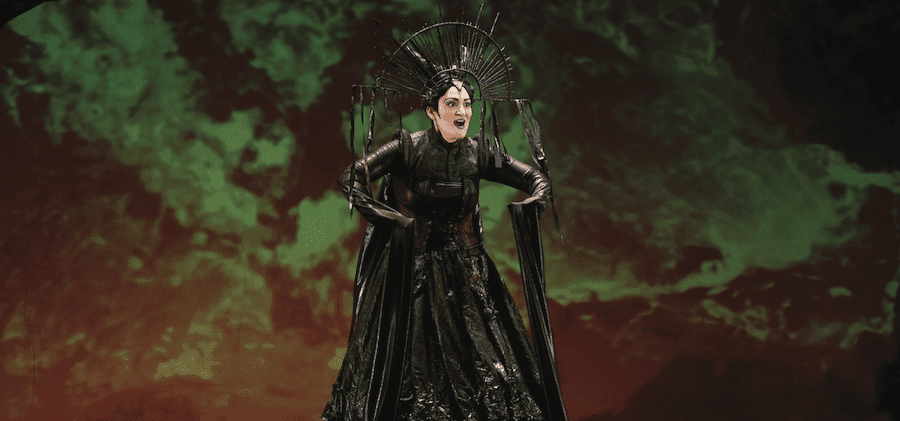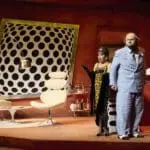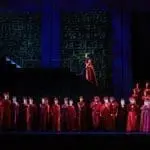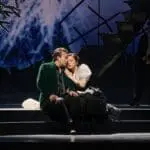Nikkei-Canadian Teiya Kasahara developed The Queen in Me over about five years, bringing the latest iteration with orchestra to a sold-out, three-show run at the Canadian Opera Company Theatre June 2-4. Co-produced by the COC, Nightwood Theatre, Amplified Opera (of which Kasahara is a co-founder) and Theatre Gargantua, the show is not an opera but thoroughly operatic in form and content. It’s a deeply personal exploration in words and music of the conflict Kasahara feels as a queer, trans, non-binary artist expected to conform to traditional norms (of audiences as well as casting directors) for operatic sopranos. Those expectations are shaped significantly by the portraits of femininity in some of opera’s best-known leading ladies—from Mimì, Manon and Butterfly to Lady Macbeth, Salome and Queen of the Night—and Kasahara samples many of them to illustrate a critique of opera and the opera industry. The Queen in Me unfolds as a kind of musical pastiche, a hodgepodge of styles of soprano doom and gloom connected by Kasahara’s acerbic commentary.
When the fake proscenium curtain opens, we encounter Kasahara in full coloratura flight in “Der Hölle Rache,” the Queen of the Night’s high-flying aria in Act II of Mozart’s Die Zauberflöte. Imposing in a splendidly regal costume (Joanna Yu designed costume and set), Kasahara makes a role they have sung many times sound easy, but then the Queen becomes uneasy and stops the show. Speaking first in German but then switching to the accented English of The Emcee in Cabaret, Kasahara raises questions about a character that’s been around for more than 200 years, and about the singers who have embodied it. “Why,” the Queen asks, “do you keep bringing me back just to put me down?” This leads to a well-paced tour of other operatic conventions and characters, all presented through their own often-familiar music. Kasahara sang with a COC Orchestra scaled down to 16 musicians, all ably conducted by Daniel Bartholomew-Poyser, who, with Kasahara and Ondrej Golias, is also credited as co-creator of an orchestral arrangement that seamlessly links Verdi, Puccini, Mozart, Strauss and others.
The show is an opportunity for Kasahara to sing snippets and excerpts of roles that are not usually associated with a coloratura soprano and some that would likely never be taken on in their entirety. The graduate of the Canadian Opera Company Ensemble Studio tackled the challenge with great skill, and while some of their commentary was bitingly critical of the opera world—much to the whooping agreement of audience members around me—there was never any doubt about Kasahara’s passion for and commitment to the art form. As the Queen puts it at one point, despite its shortcomings and hidebound traditions, opera exerts a powerful spell for which there is no antidote. Kudos to Kasahara, too, for the exuberant theatricality of their performance. The lighting of André du Toit and especially the video projections of Laura Warren created a varied dramatic setting for what was essentially an hour-long monologue, while co-directors Andrea Donaldson and Aria Umezawa helped shape the disparate musical and spoken themes into a tightly knit whole. The Queen of the Night neatly bookends the show, with Kasahara returning to “Der Hölle Rache,” supplying an assertive text while stripping off the costume to reveal a bare-chested, tatooed trans self triumphantly giving voice to Mozart’s music.
There’s a bit of a tradition of operatic shows that mix music, commentary and humour, Canadian contributions including the genial explorations of Anna Russell and Victoria-based tenor Isaiah Bell’s more recent, trenchantly personal, The Book of My Shames (albeit the latter features mainly original music). The Queen in Me is a timely, provocatively entertaining addition to the genre. Indeed, Kasahara’s Queen and Bell’s Book might make a great double bill in the grand tradition of “Cav and Pag” for our more gender-complex times.
*this text was originally published in the summer 2022 print version of Opera Canada magazine
Opera Canada depends on the generous contributions of its supporters to bring readers outstanding, in-depth coverage of opera in Canada and beyond. Please consider subscribing or donating today.















